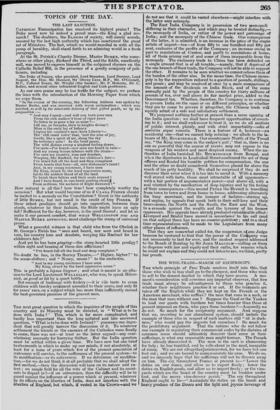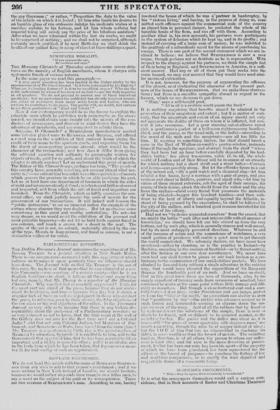THE WINE-TRADE—MARCH OF RECIPROCITY.
THE whole principle of Free Trade resolves itself into this, that those who wish to buy shall go to the cheapest, and those who wish to sell to the dearest market to which they have access. A mo- ment's consideration will convince any impartial observer, that free trade must always be advantageous to those who practise it, whether their neighbours practise it or not. If the trammels are taken off the English while they are kept on the French or the American merchant, who suffers ? the man that runs in a sack, or the man that runs without one ? Suppose the Gaul or the Yankee to load our goods with burdens ten times heavier than those at present imposed on them, who pays those burdens ?—Assuredly we do not. So much for the reciprocity argument. And suppose that we, reverting to our abandoned system, should imitate the example of those who in respect of such matters still " sit in dark- ness," who would pay the imposts but ourselves ? So much for the prohibitory argument. That the nations who do not follow our example in regulating their commercial codes by the dictates of common sense should ultimately discover their error in their sufferings, is what any reasonable man might foresee. The French have already discovered it. The man in the sack is clamouring for help ; he has tumbled, and he rolls about in the mud, incapable of rising. We are not altogetheriuninterested, for we have but one foot out; and we are bound to compassionate his case. We do so, and we sincerely hope that his sufferings will not be thrown away on him. The cry throughout France at present is—" Lower the duties on our wines, and allow us to export freely ; lower the duties on English goods, and allow us to import freely ; or the vine- yards which are the boast of the country must. be trodden under foot, and the merry vine-dresser perish." The cry throughout England ought to be—" Assimilate the duties on the harsh and heavy produce of the Douro and the light and joyous beverage of the gay Garronne ;" or rather, " Proportion the duty to the value of the article on which it is levied ; let him who limits his desires to an humble glass of yin ordinaire indulge his moderate wishes at a sacrifice suitable to his fortune, and let him whom nothing but imperial tokay will satisfy pay the price of his bibulous ambition." After what we have witnessed within the last six weeks, we ought to be surprised at nothing.; and we shall not be surprised, although certainly much gratified, if by next Birth-day we shall chink the health of our gallant King in a cup of claret at three shillings a quart.



















 Previous page
Previous page